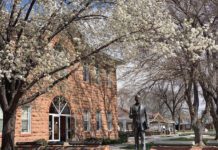As Election Day approaches, Republican incumbent Utah House Rep. Lowry Snow and challenging candidate Dorothy Engelman tenaciously campaign for voter attention throughout District 74, which includes Santa Clara, Ivins, Bloomington, Bloomington Hills, as well as the Southgate and Shivwits areas. A former attorney, Snow has spent nearly three years on the hill after being appointed to office when David Clark stepped down from his seat to run for congress at the beginning of 2012. Snow has given major force to water rights issues in Utah, and says that he hopes to assist everyone, from farmers on the ditch to the largest southern Utah municipalities, to gain more secure control to the water rights of their properties.
Engelman is a retired teacher who would like to see local governments interact more directly with people. Engelman said she feels that all representatives should hold town hall meetings on a quarterly basis to get the pulse of the people.
The Lake Powell Pipeline
In May of 2006, the Utah Legislature passed the Lake Powell Pipeline Development Act in response to population growth projections for southern Utah. If built, the pipeline could channel approximately 26.7 billion gallons of water annually to Washington County and 1.3 billion gallons annually to Kane County; however, the project faces staunch opposition from those who think the project will cost more money and produce less water than proponents project.
When the idea of building the pipeline was initially considered in 1998, the projected cost was $250 million. This figure crept up to just over $1 billion in 2008. The 2011 Draft Economic Study Report now shows estimates that could reach $2.7 billion to complete the project.
Snow, who said he is in favor of the pipeline, feels the project is necessary to provide water to the ever-growing population of Washington County.
“In 2010, the population growth rate was one of the highest in the nation, and I’m in favor of preparing for the future,” stated Snow.
While he said that he believes water conservation should be more of a focus than it has been in southern Utah, he still feels that the expanding population could and should benefit from bringing in the pipeline, expressing it to be a quality-of-life issue.
Engelman said that she strongly opposes the Lake Powell Pipeline project and sees it not as a legitimate necessity, but as an excuse for lawmakers and big real estate to dodge their role as responsible stewards of local natural resources. Engelman said that one way to remove the need for the pipeline would be by paying water rates that reflect true water cost instead of paying through property taxes. If residents see their bills rising, Engelman said, they may not be so quick to leave the shower running or water the lawn at the improper time of day.
She also said that she would like to see the county adopt a more progressively tiered schedule for water consumption, like those in other western U.S. states.
“When people start using excessive amounts of water for their household, they should be charged higher rates,” she said.
Engelman added that the very reason that people come to the area to begin with is for the charm of a close-knit, beautiful desert community.
“If we had a population three times the size of what we have now, how many people would choose to stay?” she asked. “Most people love the size of our community and I don’t feel that we stand to gain in the long run by over-developing it.”
Equality bill
In 2013, State Sen. Steve Urquhart of St. George introduced SB262, a bill that would have extended the purview of the Utah Anti-discrimination Act of 1965 to gay, lesbian, bisexual and transgender citizens. The bill failed to get a hearing in 2013 and was killed again in 2014, as legislators cited concerns that any debate over the merits of the bill could damage the state’s fight against a federal court ruling that overturned Utah’s Constitutional amendment banning gay marriage.
Now that the Supreme Court has refused to hear Utah’s challenge to the lower court, the issue is presumably now open for discussion, and Urquhart said that he intends to reintroduce the bill to the legislature.
Regarding the upcoming bill, Snow stated, “I don’t support unfair discrimination.” Snow went on to say that he is sympathetic to both sides of the issue and also stated that, while he has not yet made a final decision on how he will vote, he intends to listen closely to residents he believes that hearing debates offered in session will be the best way to fully arrive to a conclusion he can be confident in.
“I’m anxious to see what this bill ends up looking like and to see it vetted and heard in committee proceedings,” Snow said.
Engelman said that she supports the bill wholeheartedly.
“Discrimination at this point in time should not be tolerated,” she said. “My vote would be an absolute yes.”
Regarding the issue of gay marriage in Utah, both Engelman and Snow say they reject a recent suggestion by Utah Sen. Kraig Powell that Utah create a separate but equal category for LBGT unions, suggesting they be called “pairages” in order to avoid conflicts regarding procreation under current definitions of Utah laws. Both candidates agree that this would not be a viable solution.
“Our federal government has spoken about how to define marriage, and I believe that we must uphold that decision,” Snow said.
Utah’s Transfer of Public Lands Act
The Utah Attorney General’s Office continues to press forward in the process to gain control and ownership of more federally owned land within the state. The challenge requires the state to prove that the federal government’s agreement in the state’s enabling clause supersedes the U.S. Constitution’s grant of discretion to Congress over federal property.
The AG feels that Utah has a strong case to compel the courts to remand a large portion of federal lands to the state. Utah HB148 calls for litigation to be filed against the federal government on Jan. 1, 2015.
The decision to sue the federal government for the lands has been controversial because of the potentially high costs of litigation. Engelman said she opposes the idea on those grounds.
“There is no legal standing for Utah to lay claim to those lands,” she said. “I think that litigation in this instance is a frivolous waste of money that could be put to better use elsewhere.”
However, Snow has said that Utah’s lands should be in the state’s possession, and that the state should continue to push for the transfer in order to gain control and access to the resources within the state to benefit education, but he also recognizes that there must be incentive on both sides to make the argument a logical one.
“This certainly isn’t about having control for control’s sake. The federal government currently has power over 66 percent of our state’s land, and that is not just surface area — it’s mineral resources too,” he said. “I feel that if we could have control of our own land, the funds that would result could be a valuable option to fund public education.”
Alcohol laws
Utah’s notoriously strict liquor laws are a mixed bag in terms of public reaction. To some, they have been instrumental in Utah’s success at having the lowest rate of alcohol-related fatalities in the nation; however, others say that the laws not only stifle tourism, but that they also stunt economic growth by giving the impression to outsiders that Utah’s laws and culture are overly restrictive and unwelcoming of outsiders.
“I don’t have any problem with responsible adults utilizing alcohol, but I don’t want to throw away away the good things that protect our young people in this state at the expense of drawing more tourist dollars,” stated Snow. He said that after meeting with youth councils from every high school in southern Utah, he feels he gained a unique insight into their views regarding state liquor laws.
“I wanted the opinions of our youth on the Zion Curtain,” said Snow, “and for what it’s worth, they said that from their standpoints, it does impact them to sit in a dining establishment and see drinks being mixed and alcohol products being exhibited.”
Engelman looks to modernize the liquor laws and find a balance between protecting the youth and normalizing liquor laws, which may allow tourists and those who would like to drink to be able to do so in ways they experience in other states.
“People chuckle about our funny liquor laws in Utah, but they also scratch their heads and wonder why they can’t order drinks like they are able to in other states,” she said.
Engelman said thinks that the commissioners on the Utah Department of Alcoholic Beverage Control could and should be more diversified in background in order to allow liquor laws to be more fair to adults who wish to consume alcohol responsibly.
Health care and Herbert’s Healthy Utah Plan
In February of this year, Gov. Gary Herbert unveiled his Healthy Utah plan as an alternative to the Medicaid expansion offered to states by the federal government via the controversial Affordable Care Act.
The stated purpose of Herbert’s plan is to provide coverage options to those Utahns making too much to qualify for Medicaid, but too little to qualify for insurance subsidies from the federal government. Estimates on how many individuals fall into this gap are wildly different depending on the source, ranging between 54,000 to as many as 110,000 Utah residents.
If accepted, the governor’s proposal would allow Utah to receive a block grant from Washington D.C. for roughly $260 million (the amount that it would have spent on the Medicaid expansion in Utah) to fund Herbert’s three-year pilot program and purchase insurance directly from private carriers. The state of Utah would then need to provide the remaining $40 million needed to fully meet the funding projections of the proposed plan.
Healthy Utah advocates state that this strategy would provide more comprehensive coverage than Medicaid expansion would, and that it would also supports private markets, increase Utah’s flexibility in administering the plan and better serve interests specific to Utah taxpayers. Some opponents have said that the plan would make Utah further beholden to federal rules and regulations.
“I think one of the roles of the government is to make sure that the most vulnerable of our population is properly cared for,” Snow stated. He went on to say that Utah needs to make a decision about expanding Medicaid and moving forward with a plan, and that he is leaning toward supporting Herbert’s Healthy Utah limited expansion plan. “It provides independence as a state to determine how this block of money is going to be used and it allows us to utilize the private insurance-sector to provide for that care,” he said.
But Snow went on to say that his mind isn’t yet made up.
“Its a common thing to say, but the reality is that the devil is in the details and until we see it fully presented and know the indications, I’m withholding a decision.” Snow explained that his impression is that the Utah Senate is more in support of the program but that the House is more undecided. “This is a subject that will be heavily debated,” he said.
Engleman said that while she doesn’t favor the governor’s plan, she does not entirely reject it.
“If that’s all we can get, I’ll take it,” she said, “but I feel that what we’d be doing is adding another level of bureaucracy to a system that has enough bureaucracy involved.”
Engelman explained that Utahns are already paying into the expansion program through federal taxes whether they like it or not.
“Why should our money be going to other states when we have so many who could benefit from expansion




